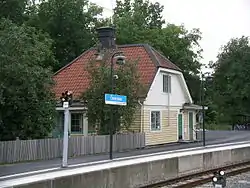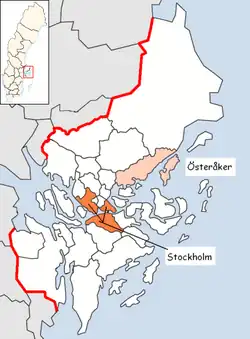Österåker Municipality
Österåker Municipality (Swedish: Österåkers kommun, IPA: [ˈœ̂sːtɛrˌoːkɛʂ kʊˈmʉːn]) is a municipality in Stockholm County in east central Sweden. Its seat is located in the town of Åkersberga, with a population of 26,727 (2005).
Österåker Municipality
Österåkers kommun | |
|---|---|
 Österskär Railway Station | |
 Coat of arms | |
 | |
| Coordinates: 59°29′N 18°18′E | |
| Country | Sweden |
| County | Stockholm County |
| Seat | Åkersberga |
| Area | |
| • Total | 554.46 km2 (214.08 sq mi) |
| • Land | 312.4 km2 (120.6 sq mi) |
| • Water | 242.06 km2 (93.46 sq mi) |
| Area as of 1 January 2014. | |
| Population (31 December 2021)[2] | |
| • Total | 48,234 |
| • Density | 87/km2 (230/sq mi) |
| Time zone | UTC+1 (CET) |
| • Summer (DST) | UTC+2 (CEST) |
| ISO 3166 code | SE |
| Province | Uppland |
| Municipal code | 0117 |
| Website | www.osteraker.se |
| Density is calculated using land area only. | |
From 1974 to 1982 Österåker was part of Vaxholm Municipality.
Its location by the Stockholm archipelago, in the Roslagen area, attracts both people who settles here, often commuting to Stockholm, and visiting tourists. Österåker boasts several golf courses, many possibilities for canoeing, horse riding, fishing and other nature activities.
Österåker also has a historical significance, with at least three notable castles from the 17th and 18th centuries, with histories tracing even further back. Sweden's once largest quartz mine, the Härsbacka mine, lays within the municipality.[3]
Like many other municipalities making up Metropolitan Stockholm, Österåker has a significant outward-commuting mainly to Stockholm, with some 13,000 commuters.
Geography
Of the 800 islands and islets, the largest one is Ljusterö, a community of its own covering the eastern side of the mainland, and accessible by car. Easy access is granted by regular ferries, including one old steam ship from 1898. Other major islands are Finnhamn, Husarö and Ingmarsö.
Localities
Demography
Population development
| Year | Population | ||||||||
|---|---|---|---|---|---|---|---|---|---|
| 1970 | 15,527 | ||||||||
| 1975 | 22,664 | ||||||||
| 1980 | 25,631 | ||||||||
| 1985 | 26,324 | ||||||||
| 1990 | 30,230 | ||||||||
| 1995 | 32,140 | ||||||||
| 2000 | 34,427 | ||||||||
| 2005 | 37,336 | ||||||||
| 2010 | 39,521 | ||||||||
| 2015 | 42,130 | ||||||||
| 2019 | 45,574 | ||||||||
|
Source: SCB - Folkmängd efter region och år. | |||||||||
Residents with a foreign background
On the 31st of December 2017 the number of people with a foreign background (persons born outside of Sweden or with two parents born outside of Sweden) was 8 916, or 20.20% of the population (44 130 on the 31st of December 2017). On the 31st of December 2002 the number of residents with a foreign background was (per the same definition) 5 079, or 14.25% of the population (35 633 on the 31st of December 2002).[4] On 31 December 2017 there were 44 130 residents in Österåker, of which 7 117 people (16.13%) were born in a country other than Sweden. Divided by country in the table below - the Nordic countries as well as the 12 most common countries of birth outside of Sweden for Swedish residents have been included, with other countries of birth bundled together by continent by Statistics Sweden.[5]
| Country of birth[5] | ||
|---|---|---|
| 31 December 2017 | ||
| 1 | 37,013 | |
| 2 | 1,367 | |
| 3 | 946 | |
| 4 | 844 | |
| 5 | Asia: Other countries | 699 |
| 6 | South America | 494 |
| 7 | 338 | |
| 8 | 283 | |
| 9 | 277 | |
| 10 | 275 | |
| 11 | 247 | |
| 12 | North America | 233 |
| 13 | Africa: Other countries | 213 |
| 14 | 184 | |
| 15 | 166 | |
| 16 | 108 | |
| 17 | 85 | |
| 18 | SFR Yugoslavia/ | 79 |
| 19 | 54 | |
| 20 | 46 | |
| 21 | 42 | |
| 22 | Oceania | 40 |
| 23 | 34 | |
| 24 | 26 | |
| 25 | 26 | |
| 26 | Unknown country of birth | 11 |
2022 Election
Elections to Swedish municipals are held every fourth year on the third Sunday in September. The 2022 election to the 51-seat council resulted in the centre-right majority of four parties (M, L, KD and C) staying in power.
| 2022 Election Results | The Majority | Red-Green Parties | Other | The Majority (M, L, C, KD) |
R-G (S, V, MP) |
Other | |||||||||
|---|---|---|---|---|---|---|---|---|---|---|---|---|---|---|---|
| M | L | C | KD | S | V | MP | RP | SD | MED | Others | |||||
| 2022 Percentage | 38.24% | 5.39% | 4.56% | 3.35% | 22.55% | 4.54% | 3.48% | 6.54% | 8.98% | 2.2% | 0.18% | 51.54% | 30.57% | 17.9% | |
| 2022 Seats | 20 | 2 | 3 | 2 | 11 | 2 | 2 | 3 | 5 | 1 | 0 | 27 | 15 | 9 | |
Public transportation
Österåker is served by the Stockholm public transport system through SL. There are six stops on the narrow gauge Roslagsbanan suburban railway and buses to Stockholm and Norrtälje as well as an extensive internal bus network.
References
- "Statistiska centralbyrån, Kommunarealer den 1 januari 2014" (in Swedish). Statistics Sweden. 2014-01-01. Archived from the original (Microsoft Excel) on 2016-09-27. Retrieved 2014-04-18.
- "Folkmängd i riket, län och kommuner 31 december 2021" (in Swedish). Statistics Sweden. February 22, 2022. Retrieved February 22, 2022.
- Lundegårdh, Per H. (1971). Nyttosten i Sverige (in Swedish). Stockholm: Almqvist & Wiksell. p. 19.
- Antal personer efter region, utländsk/svensk bakgrund och år (Read 4 januari 2019)
- Statistiska centralbyrån: Utrikes födda efter län, kommun och födelseland 31 december 2017 (XLS-fil) Läst 4 januari 2019
- "Valresultat för Kommunvalet: Österåker".
External links
- Österåker Municipality - Official site